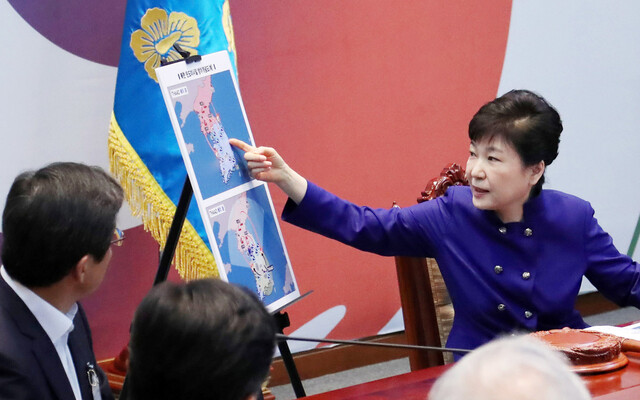hankyoreh
Links to other country sites 다른 나라 사이트 링크
[Editorial] Before deploying THAAD, respect the need for parliamentary ratification

Presiding over a meeting of the National Security Council (NSC) on July 14, President Park spoke about the deployment of THAAD to Seongju, North Gyeongsang Province. She insisted, "It's strange that people are fretting over something about which there is no need to worry. It's a safe area. Now is the time to stop these unnecessary disputes about the deployment of THAAD." This statement is unreasonable, does not jibe with the facts and ignores a reality that is staring us right in the face.
First, there has been no proof at all of the claim that the THAAD deployment will have no harmful effects on the local residents' health or on their crops. The Ministry of National Defense assures us that anyone or anything outside a 100-meter radius from THAAD's high-powered radar is perfectly safe, yet a US Army field manual says that access to the area within a 3.6-kilometer radius is denied to unauthorized personnel and calls the area beyond 3.6 kilometers the safe zone. Within the 3.6-kilometer radius of the site selected for THAAD in Seongju are found private residences, farmland, county and town offices, a public health center, and a variety of other facilities. Under the circumstances, it is completely unacceptable for our country’s president to claim that it is "strange" that people are worrying unnecessarily. Rather, it makes us think that it's strange that the president is unable to recognize the facts of the situation.
The president's characterization of the various reactions and protestations in regard to the THAAD deployment as "unnecessary disputes" shows that her governance remains as self-righteous and one-sided as ever. Now that it has become known that Seoul and the surrounding areas are outside the range of protection provided by THAAD, stronger criticism of its suitability for deployment in South Korea is being voiced.
Even lawmakers from Park's own home region of Daegu and North Gyeongsang Province (traditional conservative strongholds) have issued a statement demanding "transparent explanation of the criteria and process of selection." It is too bad the President Park does not realize that it is not just wrong to stop the debate on this issue — it is impossible under the circumstances.
The most reasonable way to conclude the dispute over THAAD deployment is to go through the process of getting the National Assembly's ratification. There is a mixture of opinions on the issue of whether the deployment of THAAD requires the ratification of the legislature. Those who say it does require legislative ratification point out that it is a matter of national security involving land use and expenditure, while the government cites the ROK-U.S. Mutual Defense Agreement as making such approval unnecessary.
However, the National Assembly Research Service has said, "It is doubtful that one can reasonably interpret the ROK-U.S. Mutual Defense Agreement or the Status of Forces Agreement as including the deployment of new weapons systems," clearly implying that THAAD deployment is an issue for ratification by the National Assembly.
Whatever the legal particulars may entail, this is something that the lawmakers must determine on the basis of the will of the people. If not outright ratification or rejection of the deployment, the National Assembly must at the very least exercise clear authority over the issue to end the confusion surrounding THAAD deployment. We ask that President Park acknowledge and respect the duties and responsibilities invested in the National Assembly.
Please direct questions or comments to [english@hani.co.kr]

Editorial・opinion
![[Column] Park Geun-hye déjà vu in Yoon Suk-yeol [Column] Park Geun-hye déjà vu in Yoon Suk-yeol](https://flexible.img.hani.co.kr/flexible/normal/500/300/imgdb/original/2024/0424/651713945113788.jpg) [Column] Park Geun-hye déjà vu in Yoon Suk-yeol
[Column] Park Geun-hye déjà vu in Yoon Suk-yeol![[Editorial] New weight of N. Korea’s nuclear threats makes dialogue all the more urgent [Editorial] New weight of N. Korea’s nuclear threats makes dialogue all the more urgent](https://flexible.img.hani.co.kr/flexible/normal/500/300/imgdb/original/2024/0424/7317139454662664.jpg) [Editorial] New weight of N. Korea’s nuclear threats makes dialogue all the more urgent
[Editorial] New weight of N. Korea’s nuclear threats makes dialogue all the more urgent- [Guest essay] The real reason Korea’s new right wants to dub Rhee a founding father
- [Column] ‘Choson’: Is it time we start referring to N. Korea in its own terms?
- [Editorial] Japan’s rewriting of history with Korea has gone too far
- [Column] The president’s questionable capacity for dialogue
- [Column] Are chaebol firms just pizza pies for families to divvy up as they please?
- [Column] Has Korea, too, crossed the Rubicon on China?
- [Correspondent’s column] In Japan’s alliance with US, echoes of its past alliances with UK
- [Editorial] Does Yoon think the Korean public is wrong?
Most viewed articles
- 1‘We must say no’: Seoul defense chief on Korean, USFK involvement in hypothetical Taiwan crisis
- 2N. Korean delegation’s trip to Iran shows how Pyongyang is leveraging ties with Moscow
- 3Amnesty notes ‘erosion’ of freedom of expression in Korea in annual human rights report
- 4‘Weddingflation’ breaks the bank for Korean couples-to-be
- 5[Reportage] On US campuses, student risk arrest as they call for divestment from Israel
- 6[Column] Park Geun-hye déjà vu in Yoon Suk-yeol
- 7Korea sees more deaths than births for 52nd consecutive month in February
- 8Will NewJeans end up collateral damage in internal feud at K-pop juggernaut Hybe?
- 9[Guest essay] The real reason Korea’s new right wants to dub Rhee a founding father
- 10[Editorial] New weight of N. Korea’s nuclear threats makes dialogue all the more urgent